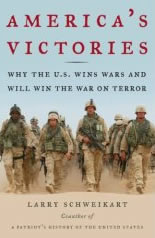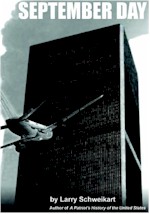If you liked "Patriot's History", consider the following works by the same authors:
(click on the book cover to order the book)
 |
48 Liberal Lies About American History: (That You Probably Learned in School) by Larry Schweikart Over the last forty years, history textbooks have become more and more politically correct and distorted about our country��s past, argues professor Larry Schweikart. The result, he says, is that students graduate from high school and even college with twisted beliefs about economics, foreign policy, war, religion, race relations, and many other subjects.
As he did in his popular A Patriot��s History of the United States, Professor Schweikart corrects liberal bias by rediscovering facts that were once widely known. He challenges distorted books by name and debunks forty-eight common myths. |
 |
America's Victories by Larry Schweikart America's armed services are under attack. From college campuses to the floor of the Senate, the Iraq war is portrayed as a quagmire, the Army is described as "broken," and our men and women in uniform are maligned as torturers. Hollywood keeps producing anti-war films, and the media celebrates liberal anti-military activists such as Cindy Sheehan. These critics fail to understand the real nature of the American military. By seeing everything through the distorted lens of Vietnam — a war shrouded in harmful myths —they have lost sight of our country's real military record, and the factors that have enabled us to win with remarkable consistency, in situations even more dire than Iraq. |
 |
Halsey's Bluff by Larry Schweikart What if the Japanese had won the battle of Midway in 1942? The impact on the war in the Pacific could have been momentous. In Halsey's Bluff, a new World War II novel by best-selling author Larry Schweikart, the Japanese do win---and Bull Halsey, whose fleet faces total destruction, must use all his skills as a leader and tactician to turn defeat into victory. For those captivated by the real stories of World War II, here is a "counter-factual" tale that reads like real life! And the action doesn't stop until the last page. For a review, see, http://home.comcast.net/~r2russ/midway//forum-current.html |
 |
The American West by Larry Schweikart and Bradley J. Birzer From the mysteries of the ancient Anasazi to the technological marvels of Silicon Valley, the American West has been a place where legends are made. In this authoritative, single-volume reference, you'll discover the full scope of Western US history and learn the true stories of the people, places, cultures, and events that have been the stuff of legends from pre-Columbian times to the present. |
 |
Encyclopedia of American Business History and Biography - Banking and Finance, 1913-1989 by Larry Schweikart This is the latest entry in an ongoing multivolume series that "chronicles America's material civilization through its business figures and businesses.'' Others in the series include Railroads in the Age of Regulation, 1900-1980 and Iron and Steel in the Nineteenth Century. Focusing on issues that have influenced the American banking industry in this century, the book consists of 115 entries that range from short topic discussions (e.g., commercial and investment banks) to longer summaries of key government legislation (e.g., the Glass-Steagall Act) to lengthy biographies (e.g., Michael Milken). |
 |
The Entrepreneurial Adventure - A History of Business in the United States by Larry Schweikart The Entrepreneurial Adventure is unique in its positive portrayal of the American entrepreneurial spirit and in its pro-market, pro-entrepreneur perspective. Professor Schweikart emphasizes that individuals, not groups, are most responsible for the creation of wealth in America, and that individual entrepreneurs, if left to their own devices, will have a better chance of solving problems than if controlled or regulated by the government. While the book covers the full extent of the history of the United States, approximately 40% of the text is concerned with the twentieth century. |
 |
September Day, a novel by Larry Schweikart September 11 was a day no American can forget, and the reactions it provoked remain with us today. Through the eyes of several individuals, we have a much clearer picture of that deadly day. Meet: - Michael Callahan, FDNY, who finds himself inside the tower as the unthinkable happens. - Falik Maleed, one of Osama bin Laden's personal assistants, dedicated killer, and terrorist, who nevertheless develops misgivings about his employer. - Thomas Palmer, professional football player, who abandons a life of wealth and fame to join the Army to fight bin Laden, then gets his wish. - "Connie" Cataris, an Ivy League economist, whose startling discoveries put him in the middle of an international plot involving bin Laden's financing that threatens to turn the world community upside down The paths of these seemingly unrelated people soon intersect with the lives of terrorist Mohammad Atta, patriotic airline passenger Rod Trainor aboard Flight 93, and dedicated CIA agents Lonnie Jackson and Cliff Harrison, with explosive---and tragic---results. This is the story of 9/11 you never heard, told in a way you never imagined! |
 |
Rodeo Cowboys in the North American Imagination by Michael Allen The eternal struggle between the frontier and civilization is at the core of our national heritage, and that's what makes rodeo an important component in the creation of American popular culture. Allen, associate professor of history and American studies at the University of Washington, Tacoma, clearly explains our continuing interest in rodeo through his combined examination of its history and its cultural interpretation. Rodeos evolved from the curious townspeople who gathered to watch goings-on at the local ranches. As the plains cowboys began to disappear, the rodeo cowboy provided audiences with an image of the real thing. If the cowboys of old liked to drink, carouse and tear things up, today's rodeo is serious business; its participants are organized, sometimes even well paid and refer to themselves as professional athletes. |
 |
Western Rivermen, 1763-1861 - Ohio and Mississippi Boatmen and the Myth of the Alligator Horse by Michael Allen After first considering the romanticized, mythical boatmen who were part of the folklore of the time, Allen (history, U. of Washington at Tacoma) draws on firsthand accounts to reveal the lonely, dangerous nature of the profession as well as the social and economic aspects of the rivermen's lives, such as their cargoes, the river towns they visited, and the impact on their lives of the steamboat and advancing civilization.
|
 |
The Confederation Congress and the Creation of the American Trans-Appalachian Settlement Policy by Michael Allen In 1783, immediately following the Revolutionary War, thousands of American pioneers began to settle in the Trans-Appalachian West. Between 1783 and 1787, the Confederation Congress passed numerous laws to govern certain activities. This study of the creation of the first American western policy forms a microcosm through which to view the ongoing course of the American Revolution. |
 |
Frontiers of Western History: The Origins, Evolution, and Future of Western History (orig., 1999, 2nd. edition, Pearson Publishing, 2007) by Michael Allen and Mary L. Hanneman (eds.), Frontiers of Western History is a clearly written and balanced reader for use in secondary and college-level Frontier History classes. The book features previously published and original works gathered from a wide cross-section of tranditional and "new" western historians, from Frederick Jackson Turner to Patty Limerick. While the book does not celebrate the "good old days" of western history, neither does it only repeat the tired leftist mantra of the "new" western historians.In sum, this is a book for those who seek a synthesis in their analysis of Western history. |
